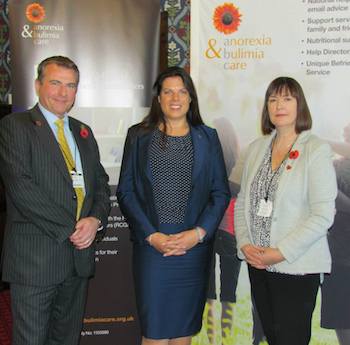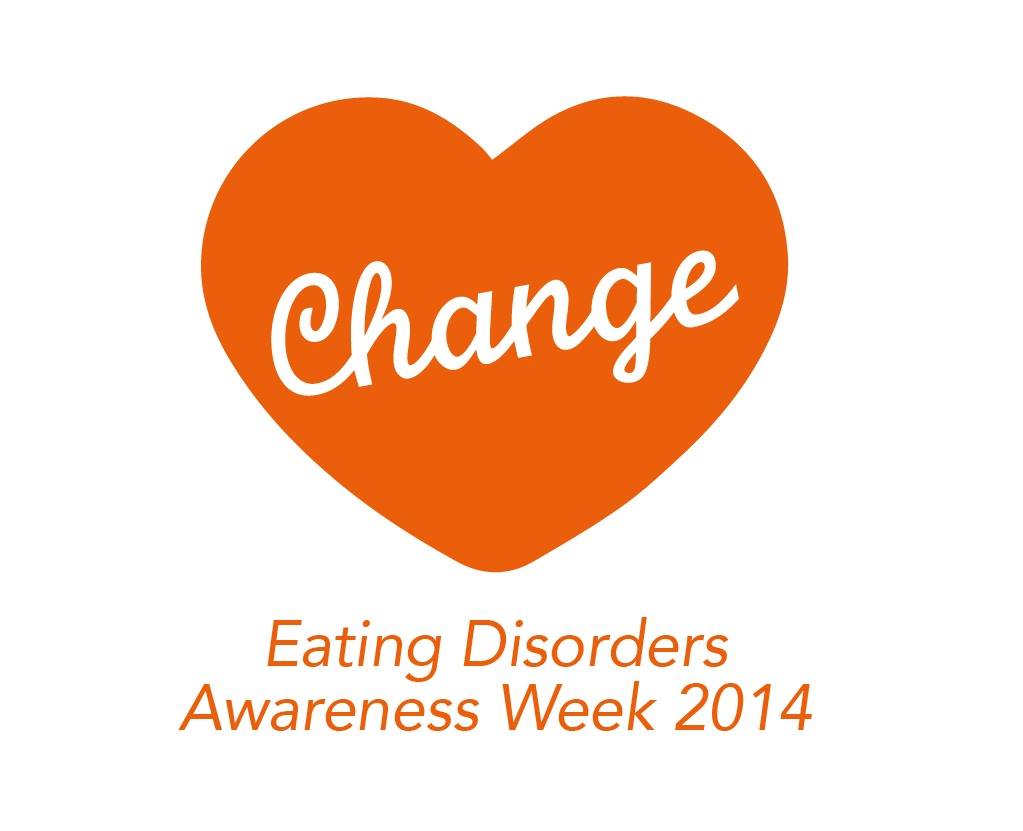Campaign
New Shadow Minister for Mental Health highlights the ‘appalling’ gaps in specialist eating disorder services at charity Action Month Event in Parliament
In one of her first speeches since becoming the Shadow Minister for Mental Health, Luciana Berger is expected today to highlight the ‘appalling’ gaps in specialist eating disorder services.
In a speech at a parliamentary event hosted by EDA: Eating Disorder Advice (EDA), Berger is expected to draw attention to the large numbers of vulnerable patients who are turned away from services because their BMI is not low enough to meet the criteria for support. The MP for Liverpool Wavertree is expected to say:
“It is unacceptable that a patient's body weight has to drop to dangerously low levels before they are given any help.” “We urgently need to see real change on the ground for patients and their families”
This event comes as figures show the number of people who became so ill with an eating disorder they needed hospital care has risen each year in recent years. With those affected struggling to access early help and treatment, the charity warns only 50% will achieve full recovery. Commenting ahead of the event Luciana Berger said:
“The appalling fact is that at a time when figures show eating disorders are becoming more prevalent, they have not been given the focus and attention they demand. Charities such as EDA: Eating Disorder Advice (EDA) do fantastic work in raising awareness and supporting people affected by Eating Disorders, but the Government must play their part too.”
News of Berger’s recent appointment to Shadow Minister for Mental Health has been eagerly welcomed by the national eating disorders charity, EDA: Eating Disorder Advice (EDA), an organisation that has been supporting people affected by eating disorders for over 55 years.
Jane Smith, Chief Executive of EDA, said:
“Eating disorders have the highest mortality rates of any psychiatric disorders and yet they are currently not prioritised within the field of mental health.
“With over 1.6 million people in the UK affected by eating disorders, we are looking forward to working together with the new Shadow Minister for Mental Health to ensure these devastating illnesses are at the top of the mental health agenda.”
The parliamentary reception will also mark the launch of EDA’s new primary care network, NetworkED, created in partnership with Dr Dominique Thompson, Director of the Students' Health Service at the University of Bristol. Commenting on the nature of working in the field of eating disorders, Dr Thompson admitted it ‘can feel a bit like walking across a field of unexploded mines; trying to engage with patients, while not triggering a close down of relations.” She added, “maybe this is why many health care professionals avoid such conversations, or profess lack of confidence in starting them.’
NetworkED, a new web-based resource, is an important step in tackling this by equipping GPs and other primary health care professionals within university, hospital and community settings across the UK with the skills they need to support patients with eating disorders effectively.
Notes to editors
-
EDA: Eating Disorder Advice’s Action Month Event will be held in the House of Commons on Monday 26th October.
-
The event will feature a direct address by Luciana Berger to the charity’s supporters and beneficiaries, along with fellow MPs, on the need for a new, prioritised focus on mental health.
-
Following on from the success of the charity’s ‘Change the Record’ awareness campaign, launched in February 2015, the event will focus on the vital changes needed in the current provision of treatment for eating disorders.
-
Data provided in answer provided to a parliamentary question showed a year on year increase in admissions for eating disorders between 2010/11 and 2013/14: http://www.parliament.uk/business/publications/written-questions-answers-statements/written-question/Commons/2015-06-16/2736/
Join Us in our Campaign for Change
During February’s Eating Disorders Awareness Week, EDA runs a social media campaign that raises the profile of eating disorders and challenges the surrounding misconceptions. Thousands of people and EDA supporters across the country get involved, sending in their awareness pictures, hosting fundraising events and flying the flag for us.
November is EDA’s official Action Month where we dedicate our focus on fundraising and campaigning. Our annual event at the Houses of Parliament is the chance for MPs, professionals, EDA Ambassadors and the media to make changes in the provision of care and treatment for people affected by eating disorders. Throughout the month we encourage supporters to hold fundraising events, raise awareness for our cause and back our calls to action, which all involve campaigning for change.
You can help us during this time by holding your own fundraising events, contacting your local press, letting us know your story and what you’d like to see change as well as signing our online petitions, and campaigning in your area. We’re calling for your support so that we can continue fighting for the vulnerable and isolated people we support every day, who are so often denied the chance to speak out.

The Change Challenge
We know that talking about eating disorders is at the heart of raising awareness and tackling the stigma that prevents people struggling from seeking help. With every conversation, we all make one step closer to creating empathy and understanding of eating disorders, meaning more people are able to access help and support. We're challenging you to get chatting for EDA and raise £5 for each person you talk to. Whether it’s your postman, friend, colleague or neighbour, your challenge is to talk openly about eating disorders and encourage as many people as you can to join our campaign. Every conversation has the potential to raise £5 for EDA. How many conversations can you have and how many people can you reach?
Talking really does save lives. Text ‘CHANGE’ to 70800
Eating Disorders Awareness Week 23rd February – 1St March 2015
‘Change The Record’

This year we launched our 'Change The Record' Campaign, with the determination to challenge the dangerous misconceptions surrounding eating disorders. EDA's Campaign encouraged people to get involved openly to challenge the discrimination people suffering often face, while also raising awareness of the need to talk about eating disorders. We asked people to get involved and tell us the misconceptions they wanted to change. The campaign reached almost 8,000 people in a week. Here are some of the misconceptions our supporters are determined to change:
Misconception: An eating disorder is a choice
Truth: Eating disorders are serious illnesses and have the highest mortality rate among psychiatric disorders.
Misconception: An eating disorder is all to do with body image and the media
Truth: At the root of almost all eating disorders is an emotional cause - a psychological illness such as depression or a response to events linked to change or loss that create distress, for example, bereavement, separation. There is also a strong correlation between abuse and the development of an eating disorder.
Misconception: An eating disorder only affects women
Truth: 25% of those affected by eating disorders are male and this figure only represents people who have accessed support. Many men feel unable to reach out for help, so don't come forwards.
Misconception: An eating disorder only affects teenagers
Truth: Eating disorders affect people of all ages and can develop at any age. EDA provides on-going support and care for adults struggling with eating disorders. Many of the people we support have suffered for decades and often alone - sometimes we're the only people they've talked to about their eating disorder.
Misconception: A personal struggling with an eating disorder is underweight
Truth: There are many different types of eating disorders and many that don’t cause weight loss or result in a low BMI, for example, Bulimia Nervosa, Binge Eating Disorder, EDNOS. Many people we support, (in severe distress and coping with serious eating disorders) are at normal or above normal weight.
EDAW might have finished for this year, but you can still get involved with our Change The Record Campaign as it launches in parliament in October. Click here to tell us the misconception you’re determined to change along with any ideas you have to achieve this. We’ll post the best entries here on our website to encourage others and use as many as possible at our parliamentary event and through social media.
November Action Month 2014 – ‘Something Has To Change’
Following on from EDA’s professional recent research study into primary care for eating disorders and the subsequent publicity generated by interviews with BBC Radio 4 for Women’s Hour, BBC Radio 5 Live and BBC Scotland, EDA launched its November Change Campaign Appeal and reached over 20 million listeners. Our research proved the anecdotal evidence from the thousands annually to our helplines that patients spend far too long waiting for treatment after GP referral, the majority at least over a month and many 4 months, 6 months and even 9 months. GPs are vital as they bear the brunt of the professional support during the wait and even after, providing vital medical monitoring to protect people’s hearts and minds from an ever-decreasing BMI and yet over a third of patients revealed that they were never offered any medical monitoring at all for their condition.

EDA is now working in partnership with the Royal College of General Practitioners (RCGP), having co-written the first training course on eating disorders that will reach up to 90,000 GPs and primary healthcare professionals. For more information about the course, click here
The results of EDA’s Research Study
-
Over half of patients (51%) spent less than 10 minutes with their GP during their initial consultation
-
More than half (55%) had to go back multiple times before getting a referral
-
Once they’d been referred, 48% had to wait over a month before their treatment started
-
The research also shows that the majority (63%) of patients don’t feel their GP offered suitable help or advice about their condition
-
45% felt their GP wasn’t caring or understanding about their illness
-
41% weren’t even referred to a specialist at all
-
But the vast majority of patients (88%) say no advice was available to their support network
-
There’s also concern that a third (33%) of respondents say no offer was made to monitor their physical health
-
More than half (55%) say GPs didn’t offer any practical solutions to help deal with their condition
-
Only 15% of respondents say their doctor suggested speaking to charities or support groups
-
Only 18% of patients said their GP was knowledgeable about their condition, only 19% said they were pro-active and 22% said they were neither kind, caring, knowledgeable or proactive.
-
28% of patients felt like time-wasters, 31% felt reluctant to seek any further help and 51% didn’t feel they were ill enough
Eating Disorders Awareness Week (EDAW) 2014

We launched our ‘Change of Heart Campaign’, which aimed to challenge the stigma surrounding eating disorders and called for empathy for those struggling.
We asked people to send in a photo of themselves at a heartfelt place holding up the ‘Change of Heart’ logo, on their iPhone, laptop, iPad or tablet, along with one sentence explaining what change they’d like to see in attitudes towards eating disorders.
We were invited to showcase our campaign at the Scottish Parliament during its conference for EDAW. “Eating Disorders: The Way Forward” was hosted by the SNP’s Dennis Robertson, MSP for Aberdeenshire West and the event featured a week’s full of activities at the Scottish Parliament, including a reception at Edinburgh Castle with the thenFirst Minister Alex Salmond, MSP and a conference at Holyrood attended by MSPs, charity representatives and health professionals. EDA was the only national charity to be asked to exhibit during the conference.